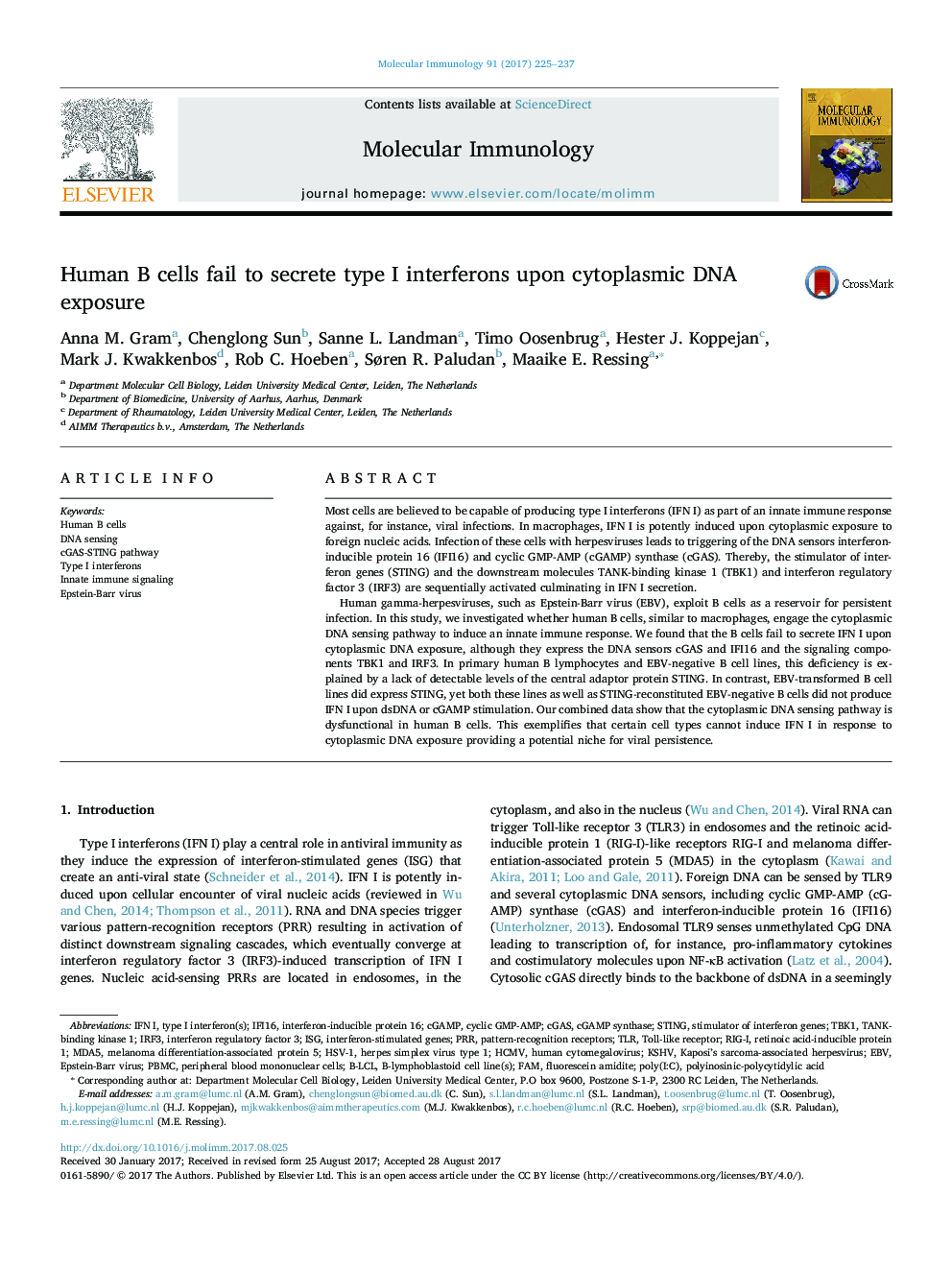| کد مقاله | کد نشریه | سال انتشار | مقاله انگلیسی | نسخه تمام متن |
|---|---|---|---|---|
| 5591865 | 1570702 | 2017 | 13 صفحه PDF | دانلود رایگان |
عنوان انگلیسی مقاله ISI
Human B cells fail to secrete type I interferons upon cytoplasmic DNA exposure
دانلود مقاله + سفارش ترجمه
دانلود مقاله ISI انگلیسی
رایگان برای ایرانیان
کلمات کلیدی
HCMVIFI16B-LCLcGAMPMDA5ISGPBMCKSHVRIG-IIRF3TBK1cyclic GMP-AMPHSV-1fluorescein amiditePRRTLRCgasFAMDNA sensing - DNA حساسEBV - اپشتین بار ویروسType I interferons - اینترفرون های نوع ITANK-binding kinase 1 - تین کیناز 1Toll-like receptor - تیالآرHuman B cells - سلول های بنیادی انسانperipheral blood mononuclear cells - سلول های تک هسته ای خون محیطیHuman cytomegalovirus - سیتومگالوویروس انسانیInnate immune signaling - سیگنالینگ سیستم ایمنی بدن انسانInterferon regulatory factor 3 - عامل تنظیمی اینترفرون 3stimulator of interferon genes - محرک ژن های اینترفرونSTING - نیشEpstein-Barr virus - ویروس Epstein-BarrHerpes simplex virus type 1 - ویروس هرپس سیمپلکس نوع 1Kaposi’s sarcoma-associated herpesvirus - ویروسهای مرتبط با سارکوم کاپوزیMelanoma Differentiation-Associated protein 5 - پروتئین متمایز Melanoma-Associated 5poly(I:C) - پلی (I: C)polyinosinic-polycytidylic acid - پلیسی سمی-پلیسییدیدیل اسیدInterferon-stimulated genes - ژن های تحریک کننده اینترفرونpattern-recognition receptors - گیرنده های شناخت الگوی
موضوعات مرتبط
علوم زیستی و بیوفناوری
بیوشیمی، ژنتیک و زیست شناسی مولکولی
زیست شناسی مولکولی
پیش نمایش صفحه اول مقاله

چکیده انگلیسی
Human gamma-herpesviruses, such as Epstein-Barr virus (EBV), exploit B cells as a reservoir for persistent infection. In this study, we investigated whether human B cells, similar to macrophages, engage the cytoplasmic DNA sensing pathway to induce an innate immune response. We found that the B cells fail to secrete IFN I upon cytoplasmic DNA exposure, although they express the DNA sensors cGAS and IFI16 and the signaling components TBK1 and IRF3. In primary human B lymphocytes and EBV-negative B cell lines, this deficiency is explained by a lack of detectable levels of the central adaptor protein STING. In contrast, EBV-transformed B cell lines did express STING, yet both these lines as well as STING-reconstituted EBV-negative B cells did not produce IFN I upon dsDNA or cGAMP stimulation. Our combined data show that the cytoplasmic DNA sensing pathway is dysfunctional in human B cells. This exemplifies that certain cell types cannot induce IFN I in response to cytoplasmic DNA exposure providing a potential niche for viral persistence.
ناشر
Database: Elsevier - ScienceDirect (ساینس دایرکت)
Journal: Molecular Immunology - Volume 91, November 2017, Pages 225-237
Journal: Molecular Immunology - Volume 91, November 2017, Pages 225-237
نویسندگان
Anna M. Gram, Chenglong Sun, Sanne L. Landman, Timo Oosenbrug, Hester J. Koppejan, Mark J. Kwakkenbos, Rob C. Hoeben, Søren R. Paludan, Maaike E. Ressing,